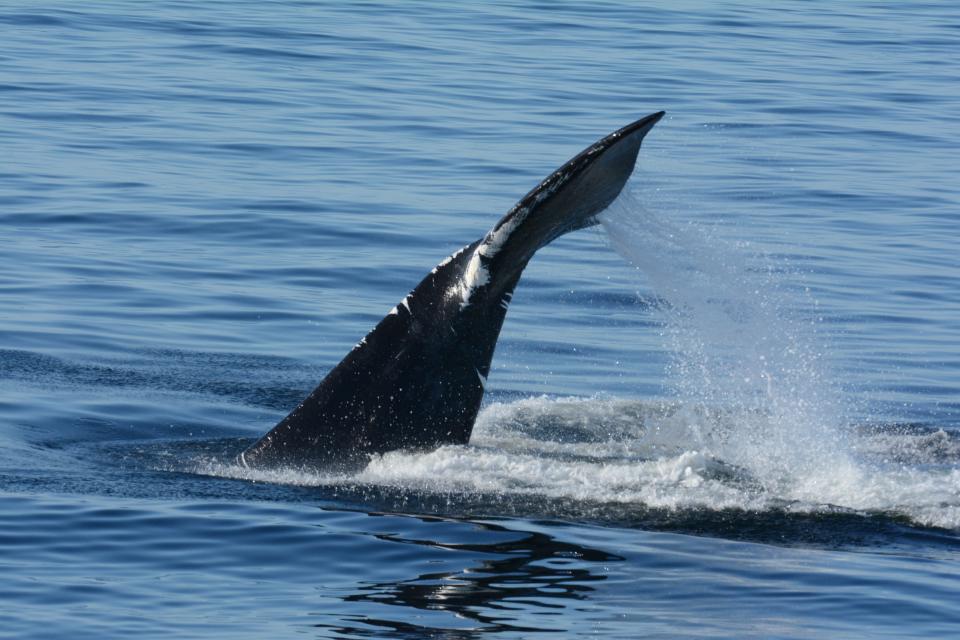It's nearly winter. Jersey Shore beaches are quiet — but not enough for our whales
While winter approaches on the Jersey Shore, the fight to save our communities, and most importantly our “aquatic neighbors” — the marine mammals that reside in and migrate along our coastline — continues in full force.
Though our beaches may have quieted down, our coastal waters have not. Whales continue to be harassed by sonar blasting, from the waters of Massachusetts to Cape May, New Jersey. Marine survey vessels — sometimes a dozen at a time — are testing the ocean bottom day and night in preparation for the construction of thousands of wind turbines, each as tall as the Eiffel Tower.
In an ocean environment where sound is critical, many marine mammals use their internal sonar for communication and to navigate away from danger. The sonar from the survey ships is disorienting these magnificent marine mammals and in some cases, forcing them into shipping lanes. As a result, whales are dying at a rate never before seen on the East Coast.

A recent survey completed by Rand Acoustics, LLC found that the sonar blasting utilized by these ships is exceeding sound levels approved by the federal government, which has failed to police the Incidental Harassment Authorizations issued by the NOAA’s National Marine Fisheries Service — or NMFS. It would appear that this agency has reordered its priorities to cater to the Biden administration’s rushed agenda to install 30 gigawatts of offshore wind power — an endeavor that the Bureau of Ocean Energy Management — or BOEM — has stated will have zero impact on climate change.
What about the North Atlantic right whale?
One of the species with the most to lose is the North Atlantic right whale, a majestic and critically endangered whale that migrates along New Jersey’s shores. There are an estimated 340 of these whales left in the world, with fewer than 70 breeding females. These mighty baleen whales, which can grow up to 52 feet long with a gross weight of 154,000 pounds, are extraordinary creatures on the brink of extinction. Clearly, the Federal Agencies responsible for their protection are failing them.
When will we lose patience?: 72 whales have died on the East Coast in a year. NOAA must take action.
More views: There are only 356 North Atlantic Right Whales left. Biased studies won't save them
Since December 2022, approximately 72 dead whales have washed ashore from Maine to North Carolina. That’s almost 2 dead whales every week, but that number represents only those that have washed ashore. How many more may have died and simply sunk to the bottom of the ocean? Sadly, we will never know.
Why NJ must continue to ask questions about offshore wind
Proponents of offshore wind argue that ship strikes, fishing gear entanglements and climate change are the primary causes for the recent unusual mortality rate of the whales. Rarely do they consider that the non-stop survey noise may be directly or indirectly responsible for the deaths.
For the sake of our marine mammals, we must raise our voices to ensure they are not relegated to history due to a reckless push to build offshore wind developments. Those of us who oppose the industrialization of our coastal waters will not be silenced.
David Shanker is a New Jersey-based spokesman for Green Oceans. He has spent every summer since he was 10 years old on the Jersey Shore. He learned to sail at an early age, was SCUBA certified at 16 and was an ocean lifeguard for Long Beach Township, NJ during his high school and college summers. He is a 50+ year member and past commodore of the Brant Beach Yacht Cluband the current president of the Brant Beach Sailing Foundation.
This article originally appeared on NorthJersey.com: NJ whale deaths: Right whales still face major sonar threats

